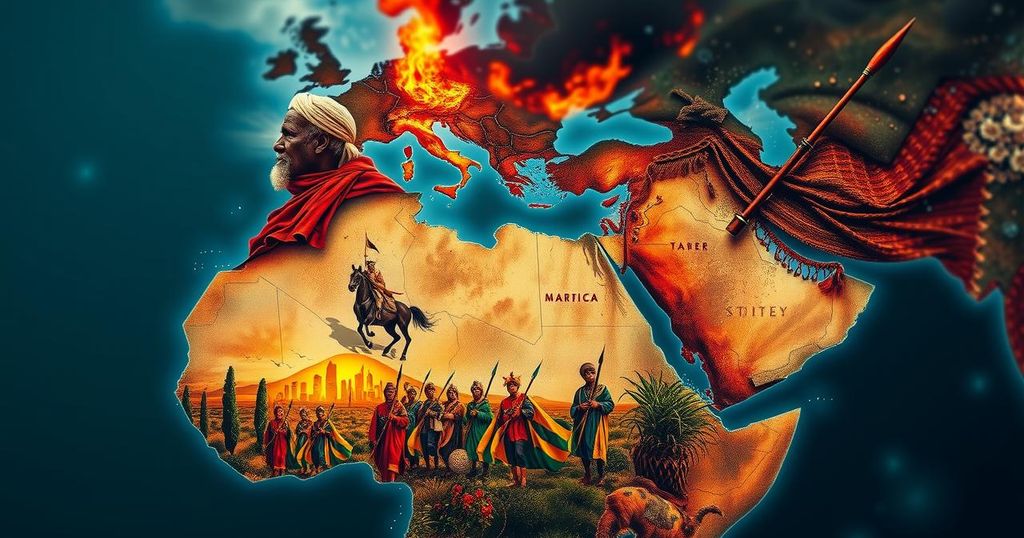Shifting Alliances and Rising Tensions in the Horn of Africa
Tensions are escalating in the Horn of Africa as Egypt, Somalia, and Eritrea consider forming a military alliance against Ethiopia amidst ongoing civil unrest and conflict. The controversial deal between Ethiopia and Somaliland has angered neighboring countries, prompting discussions of economic sanctions and military cooperation. The region faces significant instability, with potential for proxy conflicts, raising urgent calls for international attention.
“Tensions are once again escalating in the Horn of Africa as a potential military alliance is being forged among Egypt, Somalia, and Eritrea against Ethiopia. This shift in diplomacy follows a meeting held on October 10, 2024, in Asmara, Eritrea’s capital, wherein the leaders of these nations discussed the formation of a collective security arrangement, potentially including economic sanctions against Ethiopia. This burgeoning tension is contextually significant, particularly against the backdrop of Ethiopia’s prolonged civil unrest, which has resulted in catastrophic humanitarian consequences, with 600,000 lives claimed. Additionally, the ongoing conflict in Sudan has exacerbated instability, compounding the risks in an already volatile region. Central to the rising hostilities is Ethiopia’s contentious agreement with Somaliland—a region that unilaterally declared independence from Somalia in 1991. This arrangement, which allows Ethiopia access to the port of Berbera in exchange for Somaliland’s recognition, has sparked outrage from Somalia and its neighbors, with accusations that it undermines Somalia’s territorial sovereignty. By recognizing Somaliland, Ethiopia has drawn Egypt and Eritrea closer in their apprehensions related to Ethiopia’s strategic maneuvers, which may potentially allow Ethiopia to establish a naval military presence in the Red Sea—a scenario viewed with alarm by Eritrea, given its historically antagonistic relationship with Ethiopia. In this dynamically changing geopolitical landscape, Egypt’s strategy to encircle Ethiopia, particularly focusing on the Grand Ethiopian Renaissance Dam, appears to be gaining traction. With longstanding disputes over water resources, Ethiopia’s potential recognition of Somaliland has grave implications for Cairo, which perceives any military expansion by Ethiopia as a direct threat. Furthermore, the enduring conflict with Al Shabab in Somalia complicates the landscape further. Al Shabab’s strengthened ties with Iran and other militant groups amidst an ongoing U.S. arms embargo indicate a worrying trend for Somalia’s capacity to maintain order not just in Somaliland, but across the country. Eritrea’s isolation adds an additional layer of concern; while it may harbor ambitions to align with Ethiopia against the Tigray People’s Liberation Front, the long shadow of its sanctions-laden status continues. Given the recent alignment of interests among Egypt, Somalia, and Eritrea, there is a looming fear of a regression into proxy conflicts reminiscent of Cold War dynamics. The ramifications of these developments may unsettle established trade routes and military alliances, drawing the attention of global powers to an area that remains perilously underreported. This unfolding alliance, though still in its nascent stages, has set the stage for a significant shift in interstate relations, with a potential outcome either soothing tensions or escalating conflict further. Should Ethiopia move forward with its intentions regarding Somaliland, the specter of drawn-out regional rivalries and humanitarian crises grows dangerously imminent. In conclusion, while the focus will be on the specific agreements to be reached among these nations, the broader implications for regional stability cannot be understated. The Horn of Africa is at a critical juncture; its fate will hinge on the diplomatic choices made in the coming weeks and the attention garnered from the international community. Ignoring this emerging tinderbox may lead to severe repercussions not just for its inhabitants but also potentially for the world at large.
The Horn of Africa has been under immense pressure due to a variety of geopolitical conflicts, particularly those involving Ethiopia, Somalia, Egypt, and Eritrea. Ethiopia has been embroiled in a civil war for over two years, leading to significant loss of life and displacement. Concurrently, the geopolitical dynamics began shifting following a controversial agreement between Ethiopia and Somaliland, leading to heightened regional tensions. This situation is further compounded by the presence of militant groups such as Al Shabab in Somalia and the ongoing issue of Eritrean isolation due to international sanctions, creating a complex and precarious environment that risks spiraling into broader conflict.
The emerging tripartite alliance among Egypt, Somalia, and Eritrea poses a critical shift in the geopolitical landscape of the Horn of Africa, raising the risk of escalating tensions and potential conflict with Ethiopia. The implications of these alliances highlight the need for global attention and intervention to prevent a deepening humanitarian crisis and maintain stability in this volatile region.
Original Source: www.orfonline.org




Post Comment